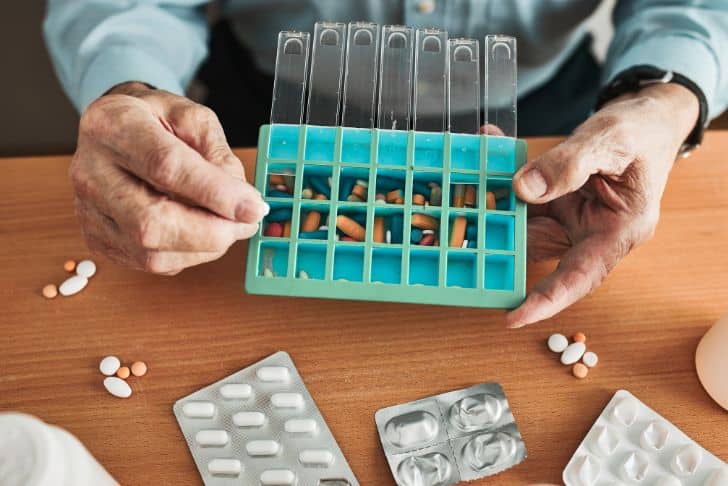If you’re in your golden years, managing your medications becomes more than just a routine – it’s vital for your overall health and wellness. Taking the correct dose at the right time, understanding the potential side effects, and knowing how each medication interacts with others is paramount, as mishaps can be dangerous. This article, ‘Guide to Medication Management for older adults,’ considers the variety of drugs available, from prescribed medication for conditions like high cholesterol or asthma, to over-the-counter options and dietary supplements, exploring how to use them safely and effectively. It also highlights the importance of communication with health care providers about allergies and potential issues, gives practical advice on organizing your prescriptions, and emphasizes the role of your pharmacist in helping manage your medications.
Along with these, it offers useful tips on how to adjust medication schedules when traveling, sheds light on understanding side effects, and demystifies the difference between brand-name drugs and their less expensive generic alternatives. Moreover, it emphasizes the necessity of maintaining a comprehensive list of all medications for those on multiple treatments, reinforcing the importance of discussing it with every health care provider you encounter.
Understanding Different Types of Medications
Distinguishing Between Prescription and Over-the-Counter Medicines
When it comes to medications, they can be broadly divided into two categories: prescription and over-the-counter (OTC) medicines. Prescription drugs are those that can only be obtained via a doctor’s order. These may include pills for lowering cholesterol or an asthma inhaler. On the other hand, OTC medications like aspirin or eye drops can be purchased without a prescription, often for common or minor illnesses such as colds, allergies, or occasional aches and pains. It’s important to remember, however, that just because medication is available over the counter does not mean it is risk-free. Always follow the instruction labels on these medications carefully.
Role and Regulation of Dietary Supplements
Aside from prescription and over-the-counter drugs, some individuals may also use dietary supplements to meet their daily needs for essential vitamins and minerals. Although they are not considered drugs, dietary supplements can impact how your body processes medications and they can have side effects of their own. That’s why it is also crucial to notify your doctor or pharmacist about any dietary supplements you are taking.
Generic vs Brand Drugs: What to Choose
When it comes to medications, the choice between generic and brand-name drugs can often be source of confusion. A generic drug is a medication created to work in the same way and have the same effects as an existing brand-name drug. While brand-name drugs are introduced by a pharmaceutical company and protected by patents, generic drugs are typically less expensive alternatives that become available after these patents expire. They contain the same active ingredients and are held to the same quality standards as their brand-name counterparts. Whether you choose a branded drug or a generic counterpart depends on several factors including cost, your doctor’s recommendation, and personal preference.
Engaging with Health Care Providers
Balancing Benefits and Risks with Your Doctor
When starting a new medication, it is critical to have a thoughtful discussion with your doctor about the potential benefits and risks. All medications, even those sold over the counter, carry some level of risk. Understanding what the expected benefits are and what potential side effects may be will help you make an informed decision about whether a particular medication is right for you.
Discussing Allergies and Previous Health Issues
Before a doctor prescribes a new medication, you should openly discuss any allergies or past health issues. This will help your doctor to avoid prescribing a medicine that could potentially harm you or interact poorly with other medications you’re taking.
Communicating about Medication Concerns during Follow-ups
Healthcare is a continuous process and so is the medication management. It’s always a good idea to directly communicate any concerns—a perceived side effect, the cost of medication, or even confusion about the directions—during follow-up visits. Your doctor wants your medication to work effectively and safely, so don’t hesitate to bring up any worries or difficulties.

Effective Medication Management Practices
Maintaining an Updated List of All Medicines
For those who take several different medications, it’s recommended to make a comprehensive list of all medicines. The list should be up-to-date and include every detail—like the name of the medicine, the required dose, the reason it’s being prescribed, and any special instructions about its administration. Having such a list will not only help you manage your medications more effectively but also enhance communication with your healthcare providers.
Following Correct Dosage and Time Instructions
It’s crucial to follow the prescribed dosage and timing provided by your doctor or pharmacist. Taking too much of a drug (an overdose) can be dangerous, while taking too little may not effectively treat the condition it was prescribed for. Also, respecting the planned schedule for drug intake ensures the appropriate levels of the medication are maintained in your body, optimizing its effectiveness.
Ensuring Consistency in Filling Prescriptions at the Same Pharmacy
In a bid to ensure your medication safety, try to fill all your prescriptions at the same pharmacy, or within the same pharmacy system. Having all your medication records in one place helps your pharmacist fully monitor your medications, recognize potential drug interactions, and ensure you receive the correct medicine and dosage.
Role of Pharmacists in Medication Management
Understanding Your Medications: Consulting Your Pharmacist
Pharmacists play a critical role in medication management. They are valuable resources for understanding your medications—their uses, possible side effects, and potential interactions with other drugs. They can also provide guidance on how to take medications properly and answer any questions you have.
Interactions and Contraindications: What Your Pharmacist Should Know
It’s important to keep your pharmacist informed about all the medications you’re taking, including over-the-counter medicines and dietary supplements. This allows them to look for potential drug interactions and give you advice that suits your specific health needs.
Generic Choices: Discussing Options with Your Pharmacist
We’ve discussed the difference between generic and brand-name drugs. Your Pharmacist is a fantastic resource for understanding these differences and exploring cost-saving opportunities like using approved generic medications.

Planning for Travel: Adjustments in Medication Schedules
Navigating Timezone Changes
Traveling can be exciting, but it also comes with particular challenges, especially for people on regular medication regimens. Timezone changes can disrupt your medication schedule, but with proper planning, these can be effectively managed. Talk to your doctor or pharmacist before your trip about adjusting the timing of your medications to suit your new time zone.
Carrying Necessary Documents and Medication Stocks
When traveling, ensure you carry along the required meds in their original containers with clear, valid labels. It’s wise to pack an extra supply of medications in case of travel delays or losses. And don’t forget your prescription information and a letter from your doctor explaining your need for the medication, particularly for controlled substances and injectable medications.
Keeping a Medicine Log while Traveling
Keeping a careful record of the meds taken is especially vital while traveling. It can be easy to miss a dose in the hustle and bustle of travel, but a medication log can help you to keep track—and to keep your medication routine as consistent as possible.
Managing Side Effects of Medicines
Identifying Common Side Effects
Side effects can range from mild reactions, like a slight rash or drowsiness— to severe, potentially life-threatening reactions, like difficulty breathing or a sudden drop in blood pressure. It’s essential to understand the common side effects of any medication you’re taking so you can identify these promptly if they occur.
Knowing When to Contact Your Doctor
If you experience any worrying side effects, don’t hesitate to seek medical help. You should immediately contact your healthcare provider if a side effect is severe, gets worse over time, or if you have a reaction that isn’t listed in the drug’s information.
Handling Minor Side Effects at Home
For minor and expected side effects, simple remedies may help. For instance, taking medication with food can help to reduce nausea. However, make sure to discuss these symptoms and any home remedies with your healthcare provider so they can monitor these symptoms and adjust your treatment plan if necessary.

Ensuring Safe Storage of Medicines
Proper Storage Conditions for Different Medications
Different medications require different storage conditions. While some need to be refrigerated, others should be kept in a cool, dry place. Always check the storage instructions of your medicines and follow them strictly to maintain their effectiveness.
Disposing Expired or Unwanted Medicines Safely
Expired or unused medications should never be simply thrown in the trash where they could be accidentally ingested or misused. Most pharmacies offer drug take-back programs where you can safely dispose of your unwanted meds.
Preventing Accidental Ingestion or Misuse
Always keep your medicines out of reach of children or pets to prevent accidental ingestion. It’s equally important to ensure each medication remains in its original container so it won’t be mistaken for something else.
Using Pill Organizers and Reminders
Benefits of Pill Organizers
Pill organizers can be handy tools to help manage your medications. They allow you to sort your doses for each day, making it easier to remember whether you’ve taken your pills and reduce the risk of accidental double-dosing.
Selecting the Right Pill Organizer
Selecting the right pill organizer depends on the complexity of your routine. You might need an organizer with separate compartments for different times of the day or a simpler one if you’re taking your medication once daily.
Setting Up Medication Reminders
Setting up medication reminders can be an effective way to make sure you never miss a dose. There are plenty of reminder apps available on smartphones, or you could use alarms or alerts. Find a method that works best for you and stick with it.
Embarking on a Healthy Lifestyle
Role of Diet and Exercise in Medication Efficacy
A healthy lifestyle complemented by balanced diet and regular exercise can play a significant role in medication efficacy. In some instances, commitment to a healthy lifestyle might even reduce the amount of medication you need.
Understanding the Impact of Alcohol and Smoking
Alcohol and smoking can interact with many medications, potentially reducing their effectiveness or even causing harmful side effects. It’s crucial to discuss any alcohol or tobacco use with your doctor or pharmacist.
Adapting to a Healthy Sleep Schedule
Sleep, or lack of it, can also impact how well some medications work. If a medication needs to be taken at bedtime or might cause drowsiness, be sure to account for this in your sleep schedule.
Impact of Health Insurance in Medication Management
Understanding Your Coverage: Prescription and OTC
Knowing what your health insurance plan covers, in terms of prescription and OTC drugs, will allow you to manage your medication expenses effectively.
Budgeting for Medication Expenses
Medication is often a significant part of healthcare expenses, so incorporating it into your budget is crucial. Always discuss cost concerns with your healthcare team, as there may be generic alternatives or other options to reduce costs.
Navigating Medicare Prescription Drug Coverage
If you’re on Medicare, understanding your prescription drug coverage (Part D) will help you figure out your medication costs, and help you decide if you need supplemental coverage. Remember, navigating health insurance is complicated—don’t hesitate to ask your doctor, pharmacist, or insurance provider if you have any questions.
